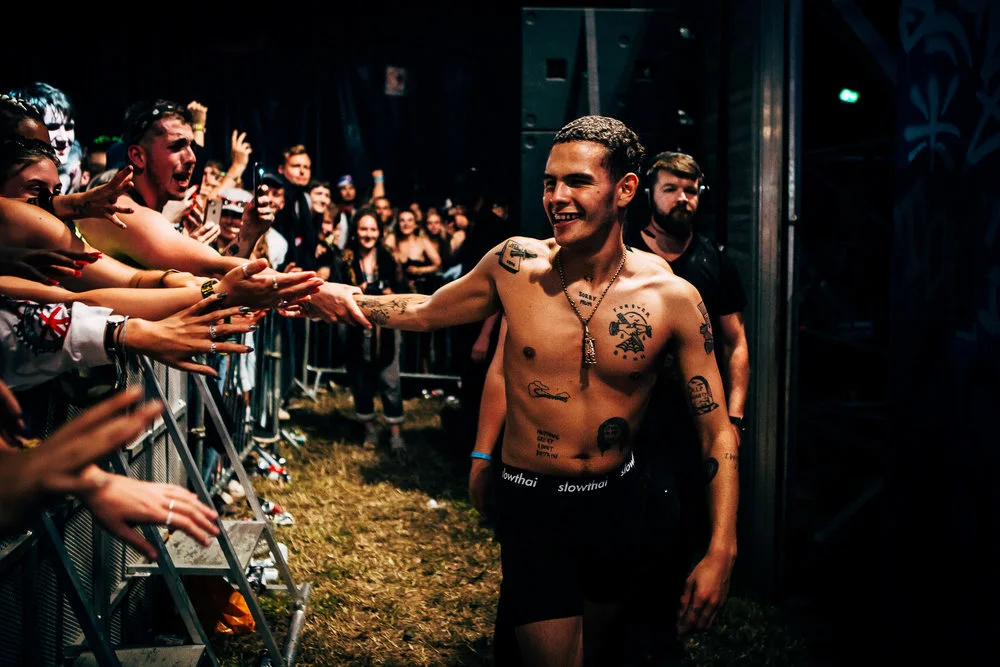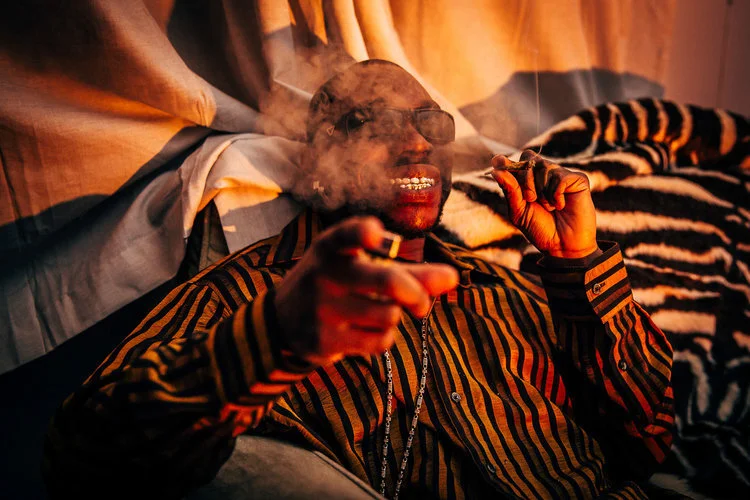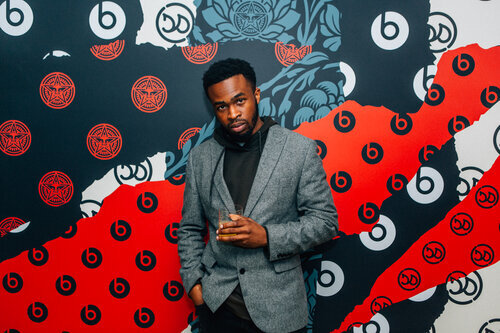Harvey is one of the key members of Raccoon. Having worked as our Operations Manager for 3 years, he developed relationships with our key clients, was a favourite amongst our photographers and was instrumental in setting up the international team and videography arm of the business. We always knew that he would eventually move on to take his photography to his full time endeavour and we are proud to have him shoot under the Raccoon umbrella. His passion lies in his music photography and his style is unique, bold and with great energy. We hope he continues to work with us for many years to come but know he is destined for great things. We asked him to talk to us about his inspiration and path to photography:
Where did you grow up and did that place influence your work?
I grew up in Royal Leamington Spa, in Warwickshire. Leamington is a small affluent town with not much going on, besides nice buildings, restaurants, bars, cafes, and parks. I would say my family had more of an influence on me being a photographer, my parents are both great photographers and constantly took photos of my life whilst I was growing up - my dad especially. They passed this trait onto me when I was really young, I remember going on trips with my primary school and I had a 35mm point and shoot camera which pretty much came with me everywhere. Camera phones first became popular whilst I was at secondary school and I first had one when I was about 12. I pretty much documented the whole of my teenage years through my phone. My grandfather, who I was really close too, was especially keen on photography and had a great amount of equipment. I inherited all of his gear when he sadly passed away and this is when I became interested in actual cameras.
As a teenager, I was into everything you'd expect of a creative person coming of age in a sleepy town. I have played the guitar since I was 7 years old, which led onto learning other instruments. I was in my first band by the age of 13. My situation and friendship group changed a lot as I got older, but my passion for music and art was always fairly consistent. I left home when I was 19 and moved to Falmouth in Cornwall, where I studied BA Press & Editorial Photography. Whilst studying, I was also involved in the music scene and I would say this period of my life is where I was most influenced by my setting. Whenever possible, I would be behind my camera taking photos of bands, club nights, parties and events.
In the second year of my degree, aged 20, I interned at Noor Images and moved to Amsterdam. Noor is a photography agency comprised of photojournalists who cover really hard subjects. At this time I wanted to be a conflict photojournalist, right up until I met photographers, Stanley Greene and Andrea Bruce. During my time working for Noor I became particularly close to Stanley Green and his stories of war coverage and travel, although thrilling and exciting, also highlighted great loss and sacrifice. After some consideration, I decided that this wasn't the route into photography for me. However, one thing did stick in my mind. During Stanley's younger years growing up in San Francisco, he documented the birth and evolution of the punk scene. I discovered a particular affinity with this part of his career, and from then on wanted music to be the main focus of my work.
After my degree, I immediately moved from Cornwall to London and interned at REX Features, which is a press agency. At the age of 22, I began assisting Richard Young, who is a notorious high society photographer. Richard would be invited to the swankiest parties in London and his job was to document the celebrity attendees. I enjoyed the glamourous side of this job but detested the actual job itself. The job involved late nights, poor pay and more often than not it was very stressful. I worked for the whole of the summer of 2015 doing this and in the winter the work dried up and I began working at a pub. Soon after, I was unable to afford to live in London and had to move back home and began working as a chef. During this time I almost gave up on the idea of being a photographer completely.
Whilst living at home I applied for every single job in the photography industry that I came across. I think I had about 10 or 15 interviews before I was successful in actually getting my first real job in the industry, which was becoming the operations manager for Raccoon London when it was under the ownership of Amy Smyth. At this time, Raccoon was solely an event photography agency and I was able to manage the business remotely from home in Lemington Spa. Amy had a real passion for documenting children's parties, so this made up the bulk of the work of the agency. Amy was also pregnant and soon after the birth of her first child, she relocated to Los Angeles with her family. A couple of months into Amy's relocation the agency was sold onto Helen Abraham. Soon after Helen bought the agency, I moved to London for the second time.
Coming back to London as a young adult has been the most important part of my career to date, coupled with having a wealth of experience in the industry, this has paved way for me to forge my career in the industry and in 2019 I became a freelance photographer. Being in London has enabled me to immerse myself in many different subcultures. This has been the most influential period I have had on my career to date.
How did you get into photography?
As I mentioned, my family were keen photographers, so I think it was only inevitable that I would also become interested in photography. However, I really took photography seriously at the age of 16, when I enrolled in a photography course at Sixth Form. At this time I wanted to be an architect and I was also studying biology, chemistry, and physics. I originally wanted to take art instead of photography, however, this wouldn't fit into my timetable and I was advised to take photography instead as it resulted in the same A-Level. Long story short, I quickly fell out of love with the idea of becoming an architect, failed my science A-levels and excelled in my photography A-level.
What’s been the biggest highlight in your career so far?
Taking the leap into being a freelance photographer!
Is there a project you’ve been wanting to shoot but not had a chance to yet? Dream subject?
I am fortunate enough to be able to shoot creative projects all the time and as I develop my skills, creative thinking and technical ability, I am also working towards my shooting my dream project.
It's difficult to explain what my dream project is, as what I consider this to be is more of a sense of achievement rather than a concept. Most of my creative briefs involve an artist or model, an original concept that is developed by both parties, a budget, materials, and equipment. I would consider my dream project to be a point in time when I work with a big artist or model, with a great budget that enables me to push the concept and direction, and also using amazing equipment.
Which photographer has most influenced your work and why? Which photography book do you keep returning to?
Stanley Greene has been the biggest influence on my work. Stanley was one of Noor Images' founding members. I began working for Stanley on the side, assisting him with editing, running errands for him and in return, I got to spend a lot of time with him. Most of what Stanely and I spoke about was music and we listened to music whilst we worked together. I'd show Stanley some artists and he'd show me some artists. During this time, I got to learn about Stanley's life in San Francisco and he gave me his book called The Western Front, which is comprised of his photographs from when he documented the punk scene in San Francisco in the 70's. This book takes pride of place in my collection and symbolises so much more than admiration for someone else's work.
A refugee camp in Ingushetia, June 2000. Stanley Greene—NOOR
Grozny, January 1995. Stanley Greene—NOOR
What purchase of £100 or less has most positively impacted your life in the last six months or recently?
A Godox Octobox Umbrella, a Speedlight bracket, radio triggers, a stand, and a bag. All of which came to less than £100.00. This has totally changed my portability, has improved my portrait game and understanding of light and works well when the clients on a budget.
Do you have a significant failure in your career that has helped drive your subsequent success?
Fortunately, I have not had any personal significant failures to date, however, I have had experiences with working with other people that have improved the way I think about what I do in my own work. One of the most important things I have learned is that communication is the best way to avoid bad situations occurring.
What is one of the best or most worthwhile investments you’ve ever made (could be money, time, energy etc)?
Learning how to use my Speedlight. Unless it is impossible, I have always found a way to create flattering light with my on-camera flash.
What is one unusual habit or an absurd thing that you love?
I'm a really noisy and silly person secretly. When I am in the privacy of my own home or in the safety of likeminded people I show my true personality. My friends and housemates usually can hear me screaming, singing stupid songs or making dumb noises.
In the last five years, what new belief, behaviour, or habit has most improved your life?
I think for most of my childhood I was always anxious, cautious and sometimes a bit of an uptight person. My parents split up when I was 6 years old and I think this had something to do with it. I noticed that my anxiety really peaked in my early twenties. In the last five years, I have found that appreciating your mental health is important and can really change your life if you're able to overcome your personal obstacles. I have had counseling and CBT Therapy and overall I feel the complete opposite now. I have my days, but these are usually caused by something happening rather than an all-consuming feeling.
What recommendations do you have for someone wanting to become a photographer? Or what advice do you wish you’d heard before starting out?
When starting out as a photographer, I received a lot of negative thoughts and opinions from people close to me about it being a career choice. People seemed to think it would be harder for me than it actually was to earn a living as a photographer. Like all jobs, you have to start somewhere. In my personal opinion, I would advise anyone who is considering being a photographer to photograph what you love and become great at doing it. You don't have to earn money at the start, but if you really apply yourself and your work speaks for itself people will soon pay you for your work.
When you are feeling creatively stuck, what do you do or what do you ask yourself?
When I am feeling stuck, I look at the work of my friends, artists I admire and work that makes me feel jealous that I didn't make it first. This usually kicks me back into gear.
What is unique in your work or approach that separates you from other photographers?
Most of my work involves musicians and artists. When working with these people you need to know about who they are, what their music sounds like, what their style is. It's crucial that I get to know that person inside and out. Through creating a close relationship with the people I work with, in return, I create an image that shows their identity as an artist through my eyes.
How important do you think social media output and engagement are in the creative industry? Has the impact been positive or negative?
I use social media all the time to connect with people I want to work with. Instagram is my virtual business card. It's changed the way I portray my identity as an artist and I think it's a great tool.
If you weren’t a photographer - what would you be?
I'd probably be a chef. I worked in kitchens from the age of 13-24 and I love cooking.
To book Harvey to photograph your brand or cover your music event please get in touch at info@raccoonlondon.com. You can view his full event portfolio here.














